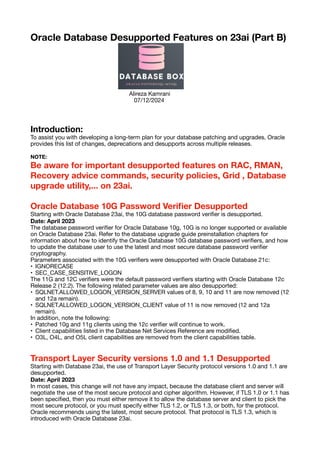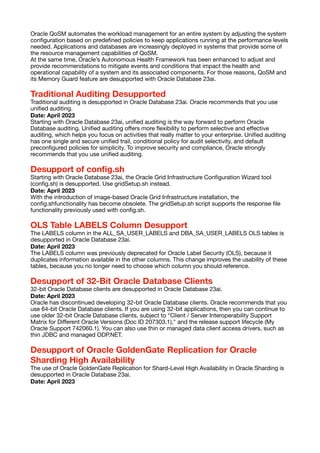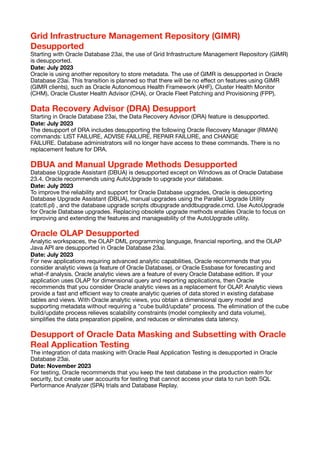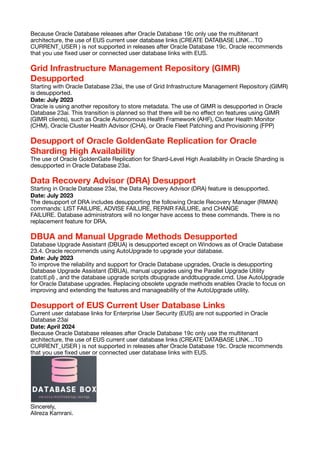Oracle Database Desupported Features on 23ai (Part B)
- 1. Oracle Database Desupported Features on 23ai (Part B) Alireza Kamrani 07/12/2024 Introduction: To assist you with developing a long-term plan for your database patching and upgrades, Oracle provides this list of changes, deprecations and desupports across multiple releases. NOTE: Be aware for important desupported features on RAC, RMAN, Recovery advice commands, security policies, Grid , Database upgrade utility,... on 23ai. Oracle Database 10G Password Veri fi er Desupported Starting with Oracle Database 23ai, the 10G database password veri fi er is desupported. Date: April 2023 The database password veri fi er for Oracle Database 10g, 10G is no longer supported or available on Oracle Database 23ai. Refer to the database upgrade guide preinstallation chapters for information about how to identify the Oracle Database 10G database password veri fi ers, and how to update the database user to use the latest and most secure database password veri fi er cryptography. Parameters associated with the 10G veri fi ers were desupported with Oracle Database 21c: • IGNORECASE • SEC_CASE_SENSITIVE_LOGON The 11G and 12C veri fi ers were the default password veri fi ers starting with Oracle Database 12c Release 2 (12.2). The following related parameter values are also desupported: • SQLNET.ALLOWED_LOGON_VERSION_SERVER values of 8, 9, 10 and 11 are now removed (12 and 12a remain). • SQLNET.ALLOWED_LOGON_VERSION_CLIENT value of 11 is now removed (12 and 12a remain). In addition, note the following: • Patched 10g and 11g clients using the 12c veri fi er will continue to work. • Client capabilities listed in the Database Net Services Reference are modi fi ed. • O3L, O4L, and O5L client capabilities are removed from the client capabilities table. Transport Layer Security versions 1.0 and 1.1 Desupported Starting with Database 23ai, the use of Transport Layer Security protocol versions 1.0 and 1.1 are desupported. Date: April 2023 In most cases, this change will not have any impact, because the database client and server will negotiate the use of the most secure protocol and cipher algorithm. However, if TLS 1.0 or 1.1 has been speci fi ed, then you must either remove it to allow the database server and client to pick the most secure protocol, or you must specify either TLS 1.2, or TLS 1.3, or both, for the protocol. Oracle recommends using the latest, most secure protocol. That protocol is TLS 1.3, which is introduced with Oracle Database 23ai.
- 2. Unix Crypt (MD5crypt) Password Veri fi er Desupported The Unix Crypt (MD5crypt) password veri fi er algorithm is desupported in Oracle Database 23ai server and clients. Date: April 2023 Enterprise User Security (EUS) customers with users in Oracle Internet Directory (OID) potentially can be using older, less secure password veri fi ers generated by Unix Crypt, either by OID, or by the operating system, before they were migrated to OID. Compared to current methods to hash the password, Unix Crypt is a less secure algorithm. Oracle Database can no longer authenticate EUS or OID users with the older password veri fi ers. Oracle recommends that you reset passwords in OID now, using newer, more secure hashing algorithms. Di ffi e-Hellman Anonymous Ciphers Desupported The use of Di ffi e-Hellman anonymous ciphers (DH anon) is desupported with Oracle Database 23ai for both outbound connections and for database client/server connections. Date: April 2023 Removing the DH anon ciphers improves the security for Oracle Database connections. The following 3 ciphers are desupported with Oracle Database 23ai: • TLS_DH_ANON_WITH_AES_256_GCM_SHA384 • TLS_DH_ANON_WITH_AES_128_GCM_SHA256 • SSL_DH_ANON_WITH_3DES_EDE_CBC_SHA If you are an Enterprise User Security (EUS) customer, then you must con fi rm that you are using server-based TLS authentication in your OID connections. For database client/server connections, you should allow the server and client to negotiate for the strongest possible connection. If a DH anon cipher was speci fi ed, then you must remove that cipher, and the database server must be authenticated for a 1-way TLS connection. Oracle Database Extensions for .NET Desupported Oracle Database Extensions for .NET is desupported. Oracle recommends that you either place .NET code in the middle tier, or use the External Procedures feature, or rewrite the code using PL/SQL or Java. Date: April 2023 Oracle Database Extensions for .NET is a feature of Oracle Database on Microsoft Windows that enables you to use stored procedures and functions written in a language managed by .NET, such as C#. Oracle Database hosts the Microsoft Common Language Runtime (CLR) in an external process, outside of the Oracle Database process. Application developers can write stored procedures and functions using any .NET compliant language, such as C# and VB.NET, and use these .NET stored procedures in the database, in the same manner as other PL/SQL or Java stored procedures. .NET stored procedures can be called from PL/SQL packages, procedures, functions, and triggers; from SQL statements; or from anywhere a PL/SQL procedure or function can be called. Migration options include: • Moving the .NET code (assemblies) into a middle tier • Using the External Procedures feature to have the external process load and execute the .NET assembly • Rewriting the stored procedures using PL/SQL or Java Quality of Service Management Desupported Starting with Oracle Database Release 23ai, Oracle Quality of Service Management (QoSM, or QoS Management) is desupported. Date: April 2023
- 3. Oracle QoSM automates the workload management for an entire system by adjusting the system con fi guration based on prede fi ned policies to keep applications running at the performance levels needed. Applications and databases are increasingly deployed in systems that provide some of the resource management capabilities of QoSM. At the same time, Oracle’s Autonomous Health Framework has been enhanced to adjust and provide recommendations to mitigate events and conditions that impact the health and operational capability of a system and its associated components. For those reasons, QoSM and its Memory Guard feature are desupported with Oracle Database 23ai. Traditional Auditing Desupported Traditional auditing is desupported in Oracle Database 23ai. Oracle recommends that you use uni fi ed auditing. Date: April 2023 Starting with Oracle Database 23ai, uni fi ed auditing is the way forward to perform Oracle Database auditing. Uni fi ed auditing o ff ers more fl exibility to perform selective and e ff ective auditing, which helps you focus on activities that really matter to your enterprise. Uni fi ed auditing has one single and secure uni fi ed trail, conditional policy for audit selectivity, and default precon fi gured policies for simplicity. To improve security and compliance, Oracle strongly recommends that you use uni fi ed auditing. Desupport of con fi g.sh Starting with Oracle Database 23ai, the Oracle Grid Infrastructure Con fi guration Wizard tool (con fi g.sh) is desupported. Use gridSetup.sh instead. Date: April 2023 With the introduction of image-based Oracle Grid Infrastructure installation, the con fi g.shfunctionality has become obsolete. The gridSetup.sh script supports the response fi le functionality previously used with con fi g.sh. OLS Table LABELS Column Desupport The LABELS column in the ALL_SA_USER_LABELS and DBA_SA_USER_LABELS OLS tables is desupported in Oracle Database 23ai. Date: April 2023 The LABELS column was previously deprecated for Oracle Label Security (OLS), because it duplicates information available in the other columns. This change improves the usability of these tables, because you no longer need to choose which column you should reference. Desupport of 32-Bit Oracle Database Clients 32-bit Oracle Database clients are desupported in Oracle Database 23ai. Date: April 2023 Oracle has discontinued developing 32-bit Oracle Database clients. Oracle recommends that you use 64-bit Oracle Database clients. If you are using 32-bit applications, then you can continue to use older 32-bit Oracle Database clients, subject to “Client / Server Interoperability Support Matrix for Di ff erent Oracle Versions (Doc ID 207303.1)," and the release support lifecycle (My Oracle Support 742060.1). You can also use thin or managed data client access drivers, such as thin JDBC and managed ODP.NET. Desupport of Oracle GoldenGate Replication for Oracle Sharding High Availability The use of Oracle GoldenGate Replication for Shard-Level High Availability in Oracle Sharding is desupported in Oracle Database 23ai. Date: April 2023
- 4. Grid Infrastructure Management Repository (GIMR) Desupported Starting with Oracle Database 23ai, the use of Grid Infrastructure Management Repository (GIMR) is desupported. Date: July 2023 Oracle is using another repository to store metadata. The use of GIMR is desupported in Oracle Database 23ai. This transition is planned so that there will be no e ff ect on features using GIMR (GIMR clients), such as Oracle Autonomous Health Framework (AHF), Cluster Health Monitor (CHM), Oracle Cluster Health Advisor (CHA), or Oracle Fleet Patching and Provisioning (FPP). Data Recovery Advisor (DRA) Desupport Starting in Oracle Database 23ai, the Data Recovery Advisor (DRA) feature is desupported. Date: July 2023 The desupport of DRA includes desupporting the following Oracle Recovery Manager (RMAN) commands: LIST FAILURE, ADVISE FAILURE, REPAIR FAILURE, and CHANGE FAILURE. Database administrators will no longer have access to these commands. There is no replacement feature for DRA. DBUA and Manual Upgrade Methods Desupported Database Upgrade Assistant (DBUA) is desupported except on Windows as of Oracle Database 23.4. Oracle recommends using AutoUpgrade to upgrade your database. Date: July 2023 To improve the reliability and support for Oracle Database upgrades, Oracle is desupporting Database Upgrade Assistant (DBUA), manual upgrades using the Parallel Upgrade Utility (catctl.pl) , and the database upgrade scripts dbupgrade anddbupgrade.cmd. Use AutoUpgrade for Oracle Database upgrades. Replacing obsolete upgrade methods enables Oracle to focus on improving and extending the features and manageability of the AutoUpgrade utility. Oracle OLAP Desupported Analytic workspaces, the OLAP DML programming language, fi nancial reporting, and the OLAP Java API are desupported in Oracle Database 23ai. Date: July 2023 For new applications requiring advanced analytic capabilities, Oracle recommends that you consider analytic views (a feature of Oracle Database), or Oracle Essbase for forecasting and what-if analysis. Oracle analytic views are a feature of every Oracle Database edition. If your application uses OLAP for dimensional query and reporting applications, then Oracle recommends that you consider Oracle analytic views as a replacement for OLAP. Analytic views provide a fast and e ffi cient way to create analytic queries of data stored in existing database tables and views. With Oracle analytic views, you obtain a dimensional query model and supporting metadata without requiring a "cube build/update" process. The elimination of the cube build/update process relieves scalability constraints (model complexity and data volume), simpli fi es the data preparation pipeline, and reduces or eliminates data latency. Desupport of Oracle Data Masking and Subsetting with Oracle Real Application Testing The integration of data masking with Oracle Real Application Testing is desupported in Oracle Database 23ai. Date: November 2023 For testing, Oracle recommends that you keep the test database in the production realm for security, but create user accounts for testing that cannot access your data to run both SQL Performance Analyzer (SPA) trials and Database Replay.
- 5. Desupport of Shared Grid Naming Service Option for Addresses The Shared GNS option of Grid Naming Service for name resolution in a cluster is desupported in Oracle Grid Infrastructure 23ai. Date: December 2023 The Shared GNS name resolution option is a daemon running on one cluster that is con fi gured to provide name resolution for all clusters in domains that are delegated to GNS for resolution, which can be centrally managed using SRVCTL commands. Starting with Oracle Database 23ai, both the option of using role to specify a primary or secondary role for GNS and the option of using Shared GNS are discontinued as deployment options. Existing con fi gurations using these features will still work after upgrade, but they will not be available for new GNS deployments. Oracle recommends that you use your own DNS to con fi gure client connections to Oracle Grid Infrastructure. DBMS_AUDIT_MGMT.FLUSH_UNIFIED_AUDIT_TRAIL Procedure Desupported The DBMS_AUDIT_MGMT procedure DBMS_AUDIT_MGMT.FLUSH_UNIFIED_AUDIT feature is desupported in Oracle Database 23ai. Date: December 2023 This procedure is no longer necessary because audit records now bypass the common logging infrastructure queues and are directly written to a new internal relational table. AUDIT_TRAIL_WRITE Mode of the AUDIT_TRAIL_PROPERTY Parameter Desupported The DBMS_AUDIT_MGMT AUDIT_TRAIL_WRITE Mode of the AUDIT_TRAIL_PROPERTY feature is desupported in Oracle Database 23ai. Date: December 2023 This procedure is no longer necessary because audit records now bypass the common logging infrastructure queues and are directly written to a new internal relational table. Cluster Time Synchronization Service Desupported Cluster Time Synchronization Service (CTSS) is desupported in Oracle Database 23ai. Date: January 2024 To synchronize time between cluster member nodes, use either an operating system con fi gured network time protocol such as ntp or chrony, or Microsoft Windows Time service. To verify that you have network time synchronization con fi gured, you can use the cluvfy comp clocksync -n allnodes command. Oracle Connection Manager Parameter (CMAN) Password Access Desupported The use of password access to Oracle Connection Manager parameters is desupported in Oracle Database 23ai. Date: March 2024 Oracle provides an enhanced connection method, Local Operating System Authentication" (LOSA), which permits only the user who started CMAN to perform admin operations. This method is consistent with other operating system authentication methods used with Oracle Database. If you are currently using password access to CMAN, then Oracle recommends that you remove the CMAN password, and instead rely on LOSA. Desupport of EUS Current User Database Links Current user database links for Enterprise User Security (EUS) are not supported in Oracle Database 23ai Date: April 2024
- 6. Because Oracle Database releases after Oracle Database 19c only use the multitenant architecture, the use of EUS current user database links (CREATE DATABASE LINK…TO CURRENT_USER ) is not supported in releases after Oracle Database 19c. Oracle recommends that you use fi xed user or connected user database links with EUS. Grid Infrastructure Management Repository (GIMR) Desupported Starting with Oracle Database 23ai, the use of Grid Infrastructure Management Repository (GIMR) is desupported. Date: July 2023 Oracle is using another repository to store metadata. The use of GIMR is desupported in Oracle Database 23ai. This transition is planned so that there will be no e ff ect on features using GIMR (GIMR clients), such as Oracle Autonomous Health Framework (AHF), Cluster Health Monitor (CHM), Oracle Cluster Health Advisor (CHA), or Oracle Fleet Patching and Provisioning (FPP) Desupport of Oracle GoldenGate Replication for Oracle Sharding High Availability The use of Oracle GoldenGate Replication for Shard-Level High Availability in Oracle Sharding is desupported in Oracle Database 23ai. Data Recovery Advisor (DRA) Desupport Starting in Oracle Database 23ai, the Data Recovery Advisor (DRA) feature is desupported. Date: July 2023 The desupport of DRA includes desupporting the following Oracle Recovery Manager (RMAN) commands: LIST FAILURE, ADVISE FAILURE, REPAIR FAILURE, and CHANGE FAILURE. Database administrators will no longer have access to these commands. There is no replacement feature for DRA. DBUA and Manual Upgrade Methods Desupported Database Upgrade Assistant (DBUA) is desupported except on Windows as of Oracle Database 23.4. Oracle recommends using AutoUpgrade to upgrade your database. Date: July 2023 To improve the reliability and support for Oracle Database upgrades, Oracle is desupporting Database Upgrade Assistant (DBUA), manual upgrades using the Parallel Upgrade Utility (catctl.pl) , and the database upgrade scripts dbupgrade anddbupgrade.cmd. Use AutoUpgrade for Oracle Database upgrades. Replacing obsolete upgrade methods enables Oracle to focus on improving and extending the features and manageability of the AutoUpgrade utility. Desupport of EUS Current User Database Links Current user database links for Enterprise User Security (EUS) are not supported in Oracle Database 23ai Date: April 2024 Because Oracle Database releases after Oracle Database 19c only use the multitenant architecture, the use of EUS current user database links (CREATE DATABASE LINK…TO CURRENT_USER ) is not supported in releases after Oracle Database 19c. Oracle recommends that you use fi xed user or connected user database links with EUS. Sincerely, Alireza Kamrani.





